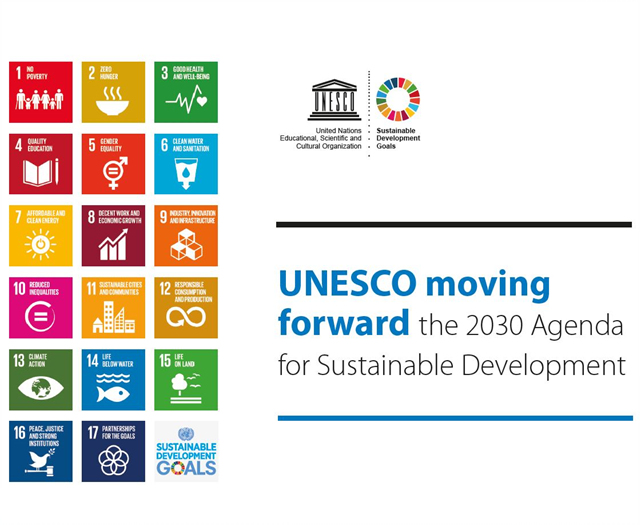UNESCO moving forward the 2030 Agenda for Sustainable Development
| Category | UNESCO |
|---|---|
| Department | UNESCO Task Force on the 2030 Agenda for Sustainable Development |
| Published Date | 2017 |
| Author | UNESCO |
| Publisher | UNESCO |
| Pages | 22 |
| Language | English |
| ISBN |
본문

Find at: https://en.unesco.org/creativity/files/unesco-moving-forward-2030-agenda-sustainable
UNESCO is actively contributing to the implementation of the 2030 Agenda for Sustainable Development drawing on its humanist mandate, and mobilizing all of its partners and stakeholders.
Introduction
UNESCO actively contributed to the shaping of the 2030 Agenda for Sustainable Development – adopted by the UN General Assembly in 2015 – drawing on its humanist mandate, and mobilizing all of its partners and stakeholders. Designed as an agenda of the people, by the people and for the people, it highlights the vital importance of human capacities, skills and knowledge to adapt and respond to the challenges and opportunities of the present and the future, many of which are still unknown. It places national ownership and support at the country level as a cornerstone for its successful implementation. Building upon the achievements and lessons learned of the Millennium Development Goals (MDGs), it seeks to address their unfinished business.
The 2030 Agenda is a universal roadmap that is strategically linked to the Sendai Framework for Disaster Risk Reduction, the Paris Climate Change Agreement, the Addis Ababa Action Agenda and the Quito Declaration on Sustainable Cities and Human Settlements for All.
The 2030 Agenda gives new impetus to UNESCO’s actions at the global, regional and national levels. It gives pride of place to the fundamental contribution of quality, inclusive education at all levels and to the importance of lifelong learning opportunities for all (SDG 4).
It breaks new ground in acknowledging the growing importance of science, technology and innovation (STI) for sustainable development (SDG 9). It contains ambitious goals in the areas of freshwater (SDG 6), biodiversity (SDG 15), the ocean (SDG 14), and climate change(SDG 13), which are major priorities for the Organization. It recognizes the role of public access to information and the safety of journalists in accelerating development opportunities and in promoting good governance and the rule of law (SDG 16). It promotes culture, through heritage and creativity, as a key enabler of sustainable development. It acknowledges the value of creating inclusive, safe, resilient and sustainable cities, and contains targets on the preservation of natural and cultural heritage (SDG 11), as well as on the recovery and return of stolen assets (SDG 16), which also include the illicit trafficking of cultural objects. It upholds a vision of just, peaceful, equitable and inclusive societies recognizing the value of knowledge, heritage and diversity. It promotes human rights and has a strong focus on gender equality (SDG 5).
UNESCO is transforming the way it works to effectively support Member States in the delivery of the 2030 Agenda, including through expanding its multi-stakeholder partnerships; transitioning towards a ‘structured financing dialogue’ to support comprehensive, integrated participatory planning on financing priorities and needs; working in close partnership with the UN system at large in delivering on the 2030 Agenda; and improving public access to quality data about its work as a key component of its commitment to strengthening transparency and accountability. The Director General’s dedicated Task Force on the 2030 Agenda also plays a key role in ensuring UNESCO’s sharp, effective and coordinated action to support countries with the implementation and review of the Agenda.










